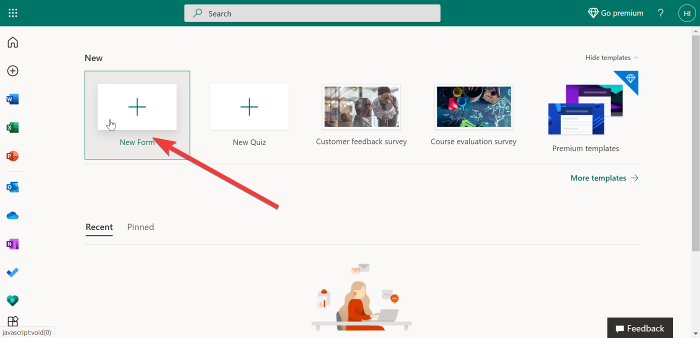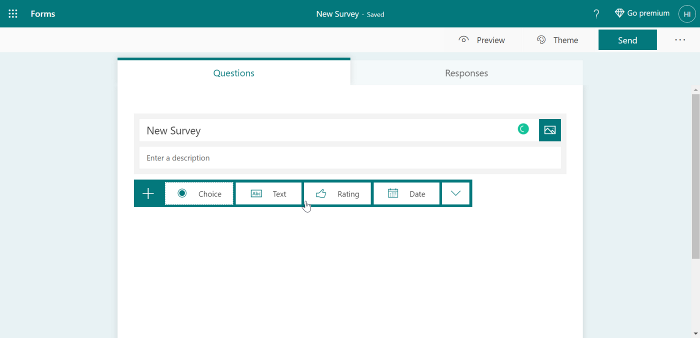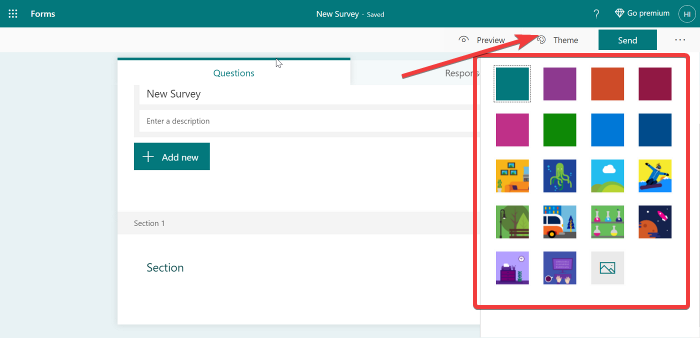Customer feedback is the key to evaluating and improving your business operations, especially in the service industry. Few methods of getting responses from customers are better than a survey. Microsoft Forms provides an easy platform for creating smart forms and surveys. Read this guide to the end as we go through the process of creating a survey using Microsoft Forms.

Create a Survey with Microsoft Forms
To create a survey using Microsoft Forms, follow the steps below:
- Sign in on the Microsoft Forms website.
- Create a new form from scratch or a prebuilt template.
- Name your survey.
- Insert question fields.
- Beautify the form.
- Send to your users.
To create surveys using Microsoft Forms, visit the Microsoft Forms website and sign in with your Microsoft account. For more benefits, you can also use a Microsoft 365 account.
To create the survey from scratch, click on the tile or button to create a New Form. Alternatively, you can take advantage of the templates that come with Office Forms by clicking on the More templates link.

Selecting this option opens up a new page with two tabs – Questions and Responses. Stay on the Questions tab. This is where you will start creating the survey. You’ll use the Responses tab when reviewing submissions for your survey.
If you opt to use a template, ensure that it fits your goals; for example, you can select the Customer feedback survey template. A Microsoft 365 subscription gives you access to many more templates.
Click on Untitled form at the top of the page to name the form and enter a description below the name.
NOTE: Form names can have a maximum of 90 characters, and descriptions go up to 1,000 characters.
You may add an image by hitting the Image icon on the right of the name field. This option lets you upload an image manually from OneDrive, your local storage, or a link from Bing.
Next, click the Add new button to add the types of responses you want your users to receive. Here, you can choose the following options:

- Choice: Multiple-choice question.
- Text: Response where the user enters text.
- Rating: Allow users to respond with a rating.
- Date: Insert a date picker.
- Ranking: Lets the end-user rank the provided options.
- Likert: Require a response to know the user’s sentiment regarding if they agree or disagree with an opinion.
- Net Promoter Score: Demand feedback on the user’s customer experience on a scale of from 0 to 10.
- Section: To group form fields and separate different groups on the survey or form.
To add more questions to your survey, hit the Add new (+) button, keeping the above guidelines in mind. When you’re done and satisfied, you can customize the form in whatever way you like.
At this point, you’ll have a plain Microsoft Forms survey. You can beautify the form with the use of themes. Click the Theme button at the top of the page and select one.
Read: How to create a Form in Microsoft Forms.
If you’re not satisfied with the preloaded themes, you can use your custom image as the background by clicking the last icon on the Themes grid. Hit the Preview button at the top of the page to look at the form before publishing.

When you’re okay with the form, click on the ellipsis button in the top right-hand corner of the screen and go to Settings. From the Settings menu, you can set the following details for your survey:
- Accept responses: It’s checked by default, and you should leave it that way if you’re doing a survey.
- Start date.
- End date.
- Email notification of each response.
- Show progress bar.
- Customize thank you message.
Finally, when it’s time to send the survey, hit the Send button at the top. This reveals several sending options. First, it generates a share link automatically. Send this link to users so they can access the survey quickly.
Read: How to add Branching in Microsoft Forms.
Alternatively, users can also access the survey by scanning a QR code if you hit the QR code button next to link. Other options for sending your survey include embedding it or sending it via email. You can select any of these methods from the options after clicking the Send button.
That’s it!
Leave a Reply